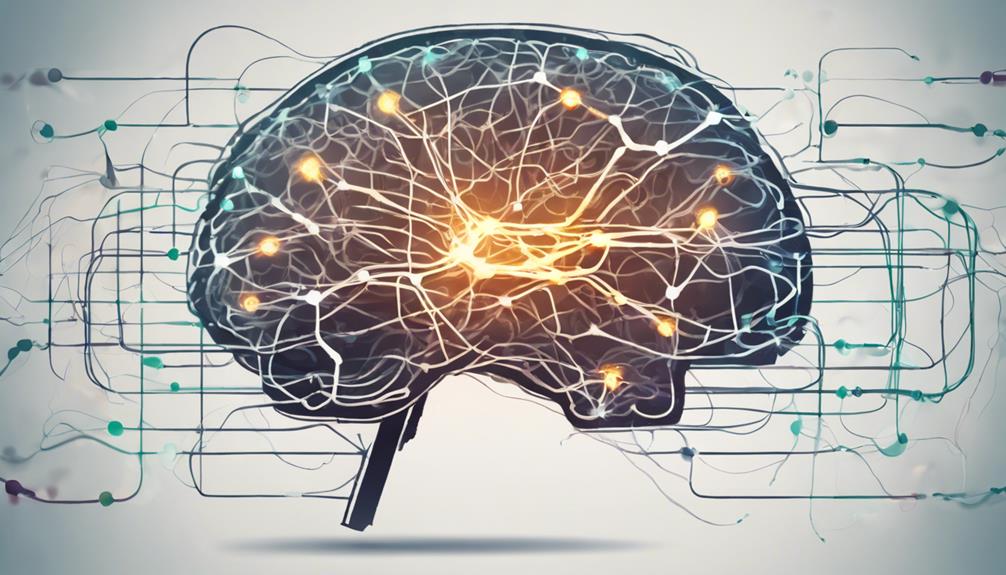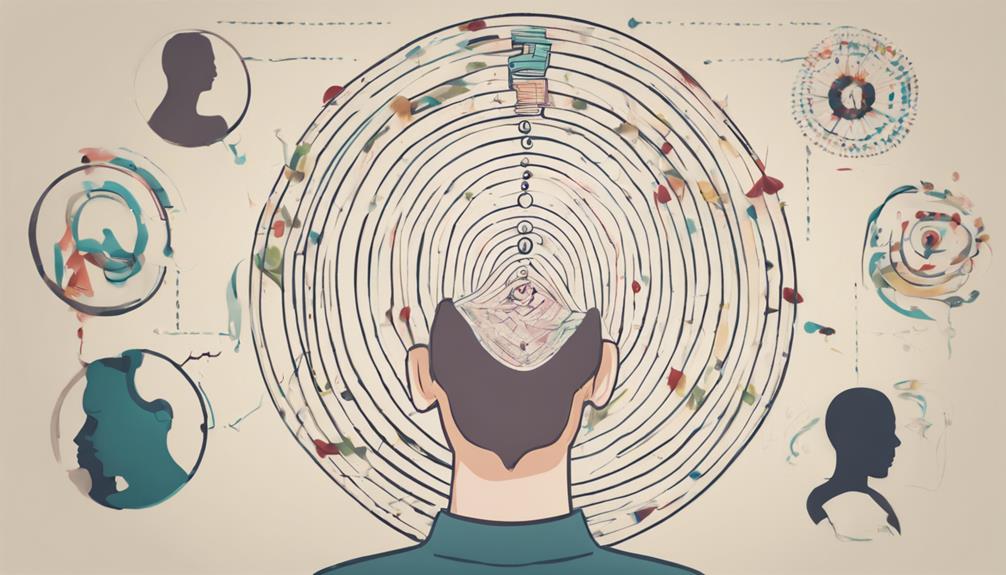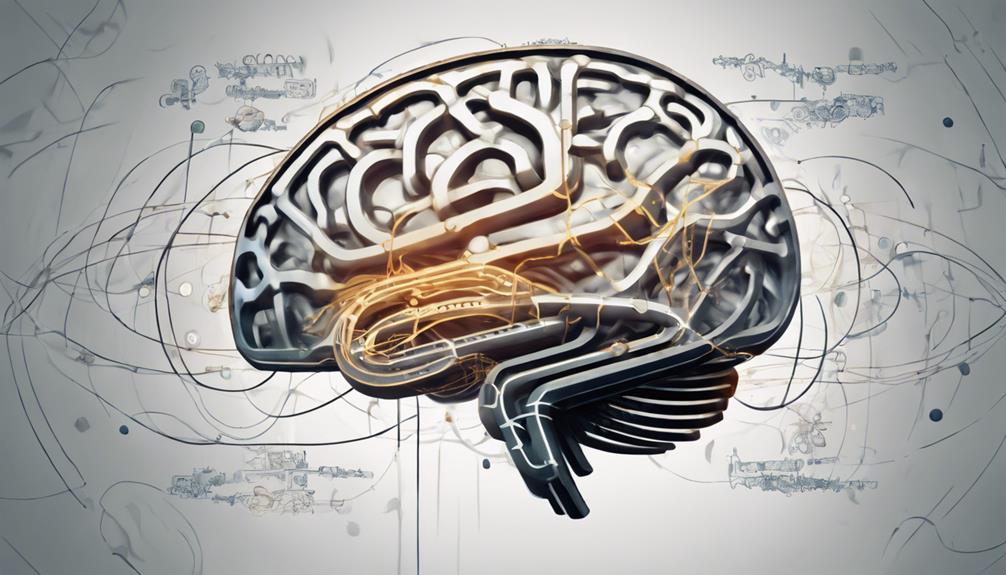Cognitive theories like schema, attentional focus, expectancy, and cognitive-behavioral influences significantly impact hypnosis. These theories play crucial roles in shaping hypnotic experiences and influencing responsiveness to suggestions. Understanding memory processing, rational emotive implications, suggestibility factors, personality traits, cognitive load, and neurocognitive models enhances the effectiveness of hypnotherapy. Each theory offers unique insights into how cognitive processes interact with hypnosis, highlighting the complexity and depth of this therapeutic technique. Exploring these cognitive theories can provide a deeper understanding of hypnosis and its applications for personal growth and well-being.
Role of Schema in Hypnosis

Examining the role of schema in hypnosis reveals the intricate cognitive processes that underlie the phenomenon, shedding light on the ways in which pre-existing mental frameworks influence hypnotic experiences. Schema development plays a crucial role in shaping an individual's hypnotic responsiveness. These mental frameworks, built through past experiences and beliefs, influence how a person interprets and responds to hypnotic suggestions.
Cognitive restructuring is a key aspect of schema development in hypnosis. By challenging and modifying existing schemas, individuals can become more open to new hypnotic suggestions and experiences. This process allows for the adaptation of mental frameworks to align with the desired outcomes of hypnosis.
Moreover, hypnotic suggestions are tailored to resonate with an individual's specific schemas, enhancing their effectiveness. By aligning suggestions with pre-existing mental frameworks, hypnotists can optimize the impact of their interventions and facilitate desired changes in behavior and perception during hypnosis.
Understanding and utilizing schema dynamics in hypnosis can significantly enhance the effectiveness of hypnotic interventions and promote positive outcomes for individuals seeking therapeutic benefits.
Attentional Theory in Hypnosis
The attentional theory in hypnosis postulates a fundamental relationship between the allocation of attentional resources and the induction of hypnotic states. Cognitive focus plays a crucial role in this theory, as it suggests that individuals who can effectively focus their attention are more likely to reach higher levels of hypnotic responsiveness.
Suggestibility levels, which refer to an individual's openness to accepting and acting upon suggestions, are closely tied to attentional processing during hypnosis. Studies have shown that individuals with higher attentional capacities tend to exhibit greater hypnotic responsiveness, indicating that the ability to allocate and maintain attention is a key factor in the hypnotic experience.
Expectancy Theory Applications

Applying expectancy theory to hypnosis involves exploring how individuals' beliefs and anticipations influence their responsiveness to hypnotic suggestions. Cognitive biases, such as confirmation bias or the tendency to interpret information in a way that confirms preexisting beliefs, can significantly impact how a person perceives and responds to hypnotic cues.
For instance, if a person strongly believes in the effectiveness of hypnosis for pain relief, they may be more likely to experience reduced pain perception during a hypnotic session due to their cognitive bias towards the positive outcomes of hypnosis.
Moreover, the placebo effect plays a crucial role in expectancy theory applications in hypnosis. When individuals expect a certain outcome from hypnosis, such as reduced anxiety or improved concentration, their minds can create physiological changes that align with these expectations.
This phenomenon highlights the powerful influence of mindset and belief systems on the effectiveness of hypnosis interventions. By understanding and leveraging cognitive biases and the placebo effect, hypnotherapists can tailor their suggestions to enhance the desired outcomes for their clients.
Cognitive-Behavioral Influences
Exploring the reciprocal relationship between cognitive processes and behavioral responses reveals the significant impact of cognitive-behavioral influences on hypnosis outcomes. Cognitive processing plays a crucial role in how individuals perceive and respond to hypnotic suggestions. The way individuals interpret these suggestions, based on their beliefs, attitudes, and expectations, can significantly influence the effectiveness of hypnosis.
Moreover, behavioral conditioning within the context of hypnosis involves reinforcing desired behaviors through positive reinforcement. By linking specific behaviors with positive outcomes during hypnosis sessions, individuals can learn to respond more readily to suggestions in the future.
This process can help enhance the overall efficacy of hypnosis by shaping behavioral responses through conditioning.
Memory Processing in Hypnosis

Understanding how memory processing operates in the context of hypnosis sheds light on the intricate mechanisms through which hypnotic suggestions are retained and integrated into individuals' cognitive frameworks.
Memory consolidation is a crucial aspect of this process, involving the stabilization of initial memory traces after learning. In hypnosis, suggestions provided during trance states can influence memory consolidation, potentially leading to enhanced retention and recall of specific information or experiences.
Cognitive flexibility plays a significant role in memory processing during hypnosis, allowing individuals to adapt their cognitive strategies to incorporate new information or suggestions seamlessly.
Moreover, cognitive control mechanisms are engaged during hypnosis to regulate attention, inhibit irrelevant information, and focus on the hypnotist's suggestions. This cognitive control facilitates efficient information processing, enabling individuals to respond to hypnotic cues more effectively.
Cognitive Dissociation Techniques
Cognitive dissociation techniques in hypnosis involve the deliberate separation of an individual's conscious awareness from certain aspects of their cognitive functioning. Through these techniques, such as cognitive restructuring and dissociation, hypnotherapists aim to create a state where the individual's mind can focus on specific thoughts or feelings while disregarding others.
Cognitive restructuring within dissociation techniques involves changing the individual's thought patterns to promote more positive behaviors or beliefs. By altering cognitive processes during hypnosis, therapists can help individuals overcome negative thought patterns or behaviors that may be causing distress or hindering personal growth.
Dissociation techniques, on the other hand, involve creating a sense of detachment from certain thoughts, emotions, or sensations. This can be particularly useful in hypnosis for managing pain, anxiety, or trauma-related symptoms. By temporarily disconnecting from distressing experiences, individuals can gain a new perspective and develop coping strategies to deal with challenging situations more effectively.
Rational Emotive Theory Implications

The Rational Emotive Theory holds significant implications for the practice of hypnosis, particularly in understanding and addressing the cognitive-emotional interplay within individuals undergoing hypnotherapy sessions. This theory, developed by Albert Ellis, focuses on how irrational beliefs lead to emotional distress and maladaptive behaviors.
In the context of hypnosis, Rational Emotive Theory emphasizes the importance of emotional regulation and cognitive restructuring to enhance therapeutic outcomes.
Hypnosis can serve as a powerful tool to challenge and modify irrational beliefs through suggestion and imagery, aligning with the principles of Rational Emotive Theory. By inducing a highly focused state of attention, hypnosis can help individuals explore and reevaluate their thought patterns, facilitating cognitive restructuring.
This process can lead to a reduction in irrational beliefs and emotional distress, ultimately enhancing the effectiveness of hypnotherapy interventions.
Hypnotic Suggestibility Factors
Exploring the factors that influence hypnotic suggestibility reveals key insights into the individual variations in responsiveness to hypnosis techniques. Personality traits play a significant role in determining an individual's susceptibility to hypnotic suggestions. Certain traits, such as openness to experience, absorption, and fantasy proneness, have been linked to higher levels of hypnotic suggestibility.
Additionally, suggestibility factors like motivation, trust in the hypnotist, and the individual's ability to focus attention can also impact their responsiveness to hypnosis. Cognitive processing plays a crucial role in determining the effectiveness of hypnotic suggestions. The way individuals interpret and process information during hypnosis can greatly influence their hypnotic response.
Factors such as cognitive flexibility, imagery abilities, and the individual's belief in the power of hypnosis can affect their overall responsiveness to hypnotic suggestions. Understanding these personality traits and cognitive processes can aid hypnotists in tailoring their techniques to suit the individual needs of each client, ultimately enhancing the effectiveness of hypnosis sessions.
Cognitive Load and Hypnotizability

Understanding the impact of cognitive load on hypnotizability is crucial in elucidating the mechanisms behind individual responsiveness to hypnosis techniques. Cognitive processing plays a significant role in determining an individual's susceptibility to hypnosis. Research suggests that individuals with higher cognitive processing capabilities may be more receptive to hypnotic suggestions due to their ability to engage in complex cognitive tasks and imaginative processes required during hypnosis.
Conversely, individuals experiencing high cognitive load, such as those under stress or with distractions, may have reduced hypnotic susceptibility as their cognitive resources are occupied with other tasks. Moreover, cognitive load can influence the depth of hypnosis a person can achieve. Those with lower cognitive load may find it easier to enter deeper hypnotic states compared to individuals with higher cognitive burdens.
Neurocognitive Models of Hypnosis
Recent advancements in neuroscience have provided valuable insights into the neurocognitive models of hypnosis, shedding light on the underlying neural mechanisms involved in hypnotic phenomena. Studies have shown that during hypnosis, there are distinct patterns of brain activity that correlate with hypnotic responsiveness. Functional neuroimaging techniques, such as fMRI, have revealed changes in brain regions associated with attention, perception, and self-awareness, suggesting a link between hypnotic states and alterations in cognitive functions.
Neurocognitive models of hypnosis propose that hypnosis involves a modulation of cognitive processes, leading to altered states of consciousness. These models suggest that hypnosis can influence attention, memory, and suggestibility through changes in neural networks and connectivity. By examining brain activity patterns before, during, and after hypnosis sessions, researchers have been able to identify specific neural signatures associated with hypnotic responsiveness.
Understanding the neurocognitive mechanisms underlying hypnosis not only enhances our knowledge of altered states of consciousness but also has implications for therapeutic interventions and the study of cognition.
Further research in this field can provide valuable insights into the neural basis of hypnosis and its potential applications in clinical settings.
Frequently Asked Questions
How Do Individual Differences Affect Susceptibility to Hypnosis?
Individual differences play a significant role in susceptibility to hypnosis. Personality traits, such as openness and absorption, can impact suggestibility. Additionally, cognitive styles, like imagery ability and attentional focus, influence hypnotizability, highlighting the multifaceted nature of this phenomenon.
Can Cognitive Theories Explain the Effectiveness of Self-Hypnosis?
Cognitive processes play a crucial role in understanding the effectiveness of self-hypnosis. By enhancing self-awareness and modifying cognitive patterns, individuals can harness the power of their mind to achieve desired outcomes through self-hypnosis techniques.
What Role Does Cognitive Development Play in Hypnosis?
Cognitive development significantly influences hypnotic suggestibility, as individuals with more advanced cognitive abilities may better engage in altered states induced by hypnosis. Understanding the relationship between cognitive development and hypnosis can enhance therapeutic outcomes.
Are There Ethical Considerations With Cognitive-Based Hypnosis Techniques?
When considering cognitive-based hypnosis techniques, it is crucial to address ethical boundaries and implications. The cognitive approach, while effective for many, may have limitations in terms of consent, autonomy, and potential psychological risks for vulnerable individuals.
Can Cognitive Theories Help Understand Resistance to Hypnosis?
Analyzing resistance to hypnosis involves exploring individual susceptibility factors within cognitive theories. Understanding how beliefs, perceptions, and cognitive processes influence receptiveness can provide insights into overcoming resistance and enhancing the effectiveness of hypnosis techniques.
Conclusion
In conclusion, cognitive theories play a significant role in understanding the impact of hypnosis.
From schemas to attentional processes, expectancy theory to memory processing, cognitive-behavioral influences to neurocognitive models, these theories provide insight into the mechanisms underlying hypnosis.
By examining how cognitive processes influence hypnotic suggestibility and hypnotizability, researchers and practitioners can enhance their understanding and application of hypnosis in various contexts.
Overall, cognitive theories offer valuable perspectives on the complex nature of hypnosis and its effects.


